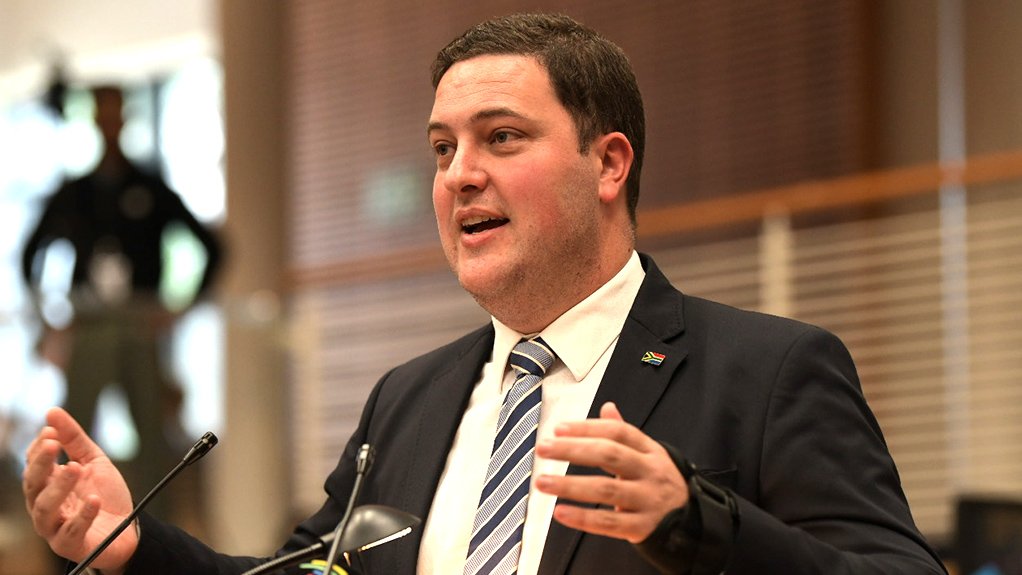By Johnathan Paoli
Cape Town mayor Geordin Hill-Lewis has pressed forward with a budget designed to address the city’s most pressing challenges, mainly infrastructure deficits, crime and economic stagnation.
Hill-Lewis delivered the city’s 2025/26 budget announcement, known as the ‘Invested in Hope’ budget amid significant political developments.
These included the shock defection of the ANC’s former opposition leader to the ruling Democratic Alliance (DA) and the failure of a motion of no confidence against the Speaker
Despite the drama in council, Hill-Lewis went on to highlight the city’s hopes in developing and expanding through targeted investment.
“In the case of our city, the biggest balancing act is between our bold plans to build the Cape Town of the future, the city that we know will be able to handle the substantial growth that is headed our way, and the need to shield our most vulnerable residents from the enormous financial pressures that make their daily lives very hard,” said Hill-Lewis.
Cape Town is grappling with the pressures of rapid urban expansion, an ongoing housing crisis, water and energy security concerns, and increasing crime rates.
The executive mayor outlined a record R39.7 billion infrastructure investment over three years, with 75% of that directed towards lower-income communities.
This includes R16.6 billion for water and sanitation, R5 billion for electricity grid improvements, and R4.5 billion for public transport expansion.
“Cape Town is set to become the country’s most populous city, and we must ensure it remains livable and prosperous,” Hill-Lewis said.
He emphasised that the budget was a “balancing act” between economic growth and social relief.
The city’s crime problem has been a central concern, particularly in gang-afflicted communities.
The budget also allocated R6.7 billion to safety and security, with a promise to deploy over 700 new law enforcement officers, including 220 specifically dedicated to escorting frontline service workers facing extortion threats.
“We are making the biggest investment in safety Cape Town has ever seen. Every ward will now have dedicated officers who will know their communities and work closely with residents,” he said.
In an attempt to ease financial burdens, the City further announced that electricity tariff increases will be capped at 2% on average, significantly lower than Eskom’s 11.32% increase to municipalities.
Water and sanitation tariffs have also been restructured to benefit lower-income households, with fixed charges now linked to property values rather than connection sizes.
This in light of opposition parties and civil society groups who have been critical of the restructuring, claiming that middle-income households will bear the brunt of the changes.
The budget speech started with a dramatic turn when it was revealed that the ANC’s Cape Town leader, councilor Banele Majingo, had defected to the DA.
The move, unprecedented in the city’s political history, sent shockwaves through both parties.
In his statement, Majingo cited the DA’s commitment to clean governance and economic growth as his reasons for switching allegiance.
The ANC has condemned the defection, calling Majingo a traitor and alleging that he had been courted with promises of a lucrative position within the DA-led administration.
Adding to the political turmoil, a motion of no confidence against the Speaker collapsed amid procedural confusion and last-minute withdrawals from supporting parties.
Initially spearheaded by opposition groups, the motion was expected to challenge the DA’s control over Council proceedings.
However, the last-minute collapse suggests fractures within the opposition ranks, further cementing the DA’s grip on the city’s leadership.
While the DA administration has positioned the budget as a transformative step towards a prosperous and secure Cape Town, opposition leaders argue that it is a distraction from deepening inequalities and the slow pace of service delivery.
INSIDE METROS

